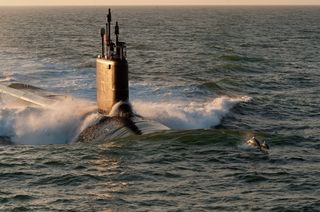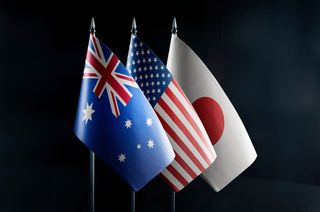The Quadrant
By Tom Switzer
Since the nuclear deal with Iran was announced on July 14, several leading American conservatives have assailed the Obama administration’s diplomatic overtures to the Islamic Republic. According to various Republican presidential candidates, the deal is “one of America’s worst diplomatic failures” (Scott Walker), “a fundamental betrayal of the security of the United States” (Ted Cruz), “one of the most destructive foreign policy decisions in my lifetime” (Rick Perry) and “a disgrace ... ridiculous ... amateur night” (Donald Trump). Another candidate Mike Huckabee has even invoked the Holocaust. Obama’s Iran policy, chided the former Arkansas governor and Fox News host, would “take the Israelis and march them to the door of the oven.”
President Barack Obama fired back, arguing that opposition to the deal stems from the same world view that led to the 2003 invasion of Iraq: “A mindset characterised by a preference for military action over diplomacy.” But this strain of thinking goes beyond Iraq. In fact, it goes back to the eve of World War Two. Call it the lessons of Munich.
In September 1938, British prime minister Neville Chamberlain met Adolf Hitler in the Bavarian city and conceded the German-speaking Sudetenland of Czechoslovakia to Germany. Promoted as “peace for our time”, the Munich agreement was supported by the great majority of the British people as well as the British establishment. But it was also the prelude to more Nazi expansionism across Europe that culminated in World War Two. Ever since, politicians and commentators have all too often compared an aggressive dictator or regime to Hitler or the Nazis.
Whether appeasement is sound policy depends in part on the nature of one’s adversary. Britain’s appeasement of the United States, starting with the Venezuela crisis of 1895, paid good dividends throughout the entire twentieth century because Washington was a power open to reasonable compromise which evolved over time into an alliance. Sometimes, however, the lesson of Munich is apt: in dealing with an insatiable imperialistic power that poses a genuine threat, compromise indeed represents futile appeasement. Think of the Yalta accords in February 1945, which set the scene for the spread of “red Fascism” and the Cold War.
A whole book could be written about the uses and abuses of “appeasement” and the endless invocation of the dirty word of Munich. When Egyptian president Gamal Abdel Nasser seized the Suez Canal in 1956, British prime minister Anthony Eden declared “no more Munichs.” Eden himself had credibility on the subject: he had resigned as British foreign secretary in 1938 to protest Chamberlain’s “appeasement” policy. That did not stop his military expedition in Egypt from turning into a national humiliation and his own political demise.
Lyndon Johnson also invoked the lessons of Munich in the mid-1960s when he stood up to the Vietnamese communists and prosecuted the war in Indo-China. When Bill Clinton stood up to Yugoslav president Slobodan Milosevic and authorised air strikes against Serbia in 1999 he asked: “What if someone had listened to Winston Churchill and stood up to Adolf Hitler earlier? How many people’s lives might have been saved?” And in the lead-up to the invasion of Iraq in 2003, many neo-conservatives compared opponents of the war with the earlier appeasers.
When John F Kennedy refused to take military action against Cuba during the 1962 missile crisis, the US Air Force general Curtis LeMay complained his decision was “almost as bad as the appeasement at Munich”. Richard Nixon, a long-time opponent of “Red China”, embarked on rapprochement with the Communist mainland in early 1970s. Ronald Reagan, a long-time opponent of the “evil empire,” embraced detente with the Soviets in the mid-to-late 1980s. Both Republican presidents provoked a hostile response from conservatives.
When Nixon announced his decision in July 1971 to visit China, conservatives lashed out. They had never forgiven Harry Truman and Dean Acheson for betraying Chiang Kai-shek in 1949, and two decades later they were in no mood to tolerate what National Review publisher William Rusher would call “one of the greatest double crosses of all time.” William Loeb, publisher of New Hampshire’s Union Leader, warned that Nixon’s shift of attitude was “immoral, indecent, insane and fraught with the danger for the survival of the United States.” Twelve leading conservatives publicly suspended their support of the president, backing Ohio congressman John Ashbrook’s ill-fated campaign in the 1972 Republican primaries.
When Americans saw those incredible TV pictures of a Chinese band striking up the Star Spangled banner for Nixon, and the visiting American president dining with the Chinese Communists, National Review editor William F. Buckley, Jr. announced that America had “lost — irretrievably — any remaining sense of moral mission in the world.” “It is like God and the devil having a high-level meeting,” charged Rev Carl McIntyre of the Vietnam March for Victory Committee. John Wayne, one of the few Republicans in Hollywood, lamented that the Nixon trip was “a real shocker.”
Skip forward 15 years to Ronald Reagan’s ground-breaking nuclear reductions deals with Mikhail Gorbachev. Once again, conservatives were aghast. Emmett Tyrell, Jr, the editor of The American Spectator, said Reagan was behaving “arrogantly, deviously and as the classic appeaser”. “Reagan has accelerated the moral disarmament of the West,” George Will complained, “by elevating wishful thinking to the status of political philosophy.” Charles Krauthammer denounced the phenomenon of “Americans getting dizzy over Gorbachev.” The conservative Wall Street Journal published several editorials in the winter of 1987–88 condemning Reagan for being “snookered into letting the Soviets turns arms-control talks to their own purposes.” The Anti-Appeasement Alliance, a group of hard-line anti-Soviet conservatives, published anti-INF treaty advertisements comparing Reagan to Chamberlain. Howard Phillips, co-chair of the alliance, declared Reagan had become “a useful idiot for Kremlin propaganda”.
In the Senate, meanwhile, Jesse Helms led a conservative effort to introduce amendments designed to kill the treaty. And in the run-up to the 1988 Republican presidential primaries, centre-right Heritage Foundation president Edwin J. Feulner, Jr. warned: “Whoever Reagan’s successor is will have a hard time mobilising [conservatives] because Ronald Reagan walked away from them in the end.”
In the end, the opposition failed to stop Reagan’s treaty and his vice president George H. W. Bush won office later that year. Moreover, on almost any judgement, history has vindicated both Nixon’s rapprochement with Communist China and Reagan’s detente with the Soviets.
In the 1970s, Nixon broke a 23-year-old taboo on negotiating with the world’s most populous nation, which enabled Washington to exploit the Sino–Soviet split to create a new global balance of power. And Reagan’s move to detente with the Kremlin, following his more hard-line first term, helped pave the way for America’s victory in the Cold War.
More recently, the Ukraine crisis has brought more cries of Munich. The accusers range from Prince Charles and French socialists to John McCain and Hillary Clinton, to the editorials and opinion pages of more than a few newspapers. Vladimir Putin is a latter-day Hitler and the term appeasement has been applied to anyone who opposes the isolation of Russia to a modern-day Chamberlain. To accommodate Putin, we are warned, is akin to repeating the mistakes of Munich.
But the invocation of Munich, Chamberlain and appeasement is foolish. True, just as Hitler used the supposed oppression of the Sudetenland Germans as an excuse to break up Czechoslovakia, Putin has used the presence of an ethnic group, Russians, as justification to meddle in Ukraine. But whereas the totalitarian Hitler set out to dominate the world, a strong case could be made that the autocrat Putin’s foreign policy has reactive and defensive. It has been driven in response to years of NATO and EU expansion into areas that Moscow had deemed its sphere of influence long before Lenin and Stalin appeared on the scene. Add to this the coup in February 2014 that toppled Viktor Yanukovych — the democratically elected, pro-Russia Ukrainian president — that further upset Russian sensibilities, and it is no wonder Putin took Crimea (the traditional home of the Russian Black Sea fleet), which he feared would become a NATO base. Meanwhile, he has sought to destabilise Ukraine until its new anti-Russian government accepts its status as a buffer state between East and West.
Putin’s behaviour has hardly been surprising. When great powers believe their vital strategic interests are at stake, they will fight tooth and nail to protect them. If Moscow really were bent on emulating the Nazis, where was the evidence of its relentless expansion before the 2014 coup? It was this event that sparked Putin’s military incursion in the Crimean peninsula — just as it was Georgian president Mikheil Saakashvili’s invasion of the breakaway province of South Ossetia that prompted Russia to meddle in its near abroad in 2008.
In these circumstances, it makes no sense to condemn Russian exercises of power in what Moscow has long deemed as its near abroad, without assessing Russian motives. But it does make sense to determine whether the Russians are intervening in a first step towards overturning the international state system a la Hitler or as a way to protect a buffer zone. The Minsk accords of February 2015 indicate that western European statesmen think that Putin’s conduct fits the latter condition.
Which brings us back to the Iranian nuclear deal. Does the West’s accommodation of the Mullahs amount to not just appeasement but a “historic mistake,” as Israeli Prime Minister Benjamin Netanyahu warns? At first glance, there are plausible reasons to think so. After all, Iran is a radical, clerical and deeply anti-Western regime that has sponsored brutal Shia militia proxies in the Persian Gulf. In June, the State Department reported: “Iran’s state sponsorship of terrorism worldwide remained undiminished in 2014.” Former US secretaries of state Henry Kissinger and George Shultz reflect the thoughts of many when they say the deal does nothing to change the Islamic Republic’s “three-and-half decades of militant hostility to the West”.
On the other hand, the deal to restrict Iran’s enrichment program in exchange for loosened sanctions is better than the alternatives. Tighter sanctions were bound to erode. Attacking Tehran would have consolidated the regime and delayed a bomb by only a few years. And if there were one thing that would unite Iranians, a preventive strike would probably be it. There is now instead a chance of political change in Iran in coming years. And make no mistake: the younger generations of Iranians are far more progressive than their conservative elders and Sunni equivalents in the Arab world. Barack Obama’s diplomatic outreach may add more momentum to political reform. The more liberal Iran becomes, the more likely it is to emerge as a modernising influence on the region.
Bear also in mind that the nuclear deal reflects President Obama’s attempt to ground his Middle East policy in what he sees as the emerging realities in the region. Washington and Tehran today find themselves sharing the same enemy — one equipped with a potent mix of money, tactical nous, violent religious fervour and caliphate ambitions — from eastern Syria to north-western Iraq to North Africa.
If one believes, as most Americans and indeed Australians do, that Islamic State represents a grave and present danger, and that defeating this menace is of overriding strategic concern, then there’s a case for strengthening cooperation with Tehran and its Shia crescent of Baghdad, Damascus and southern Lebanon. Julie Bishop, judging from her April trip to Tehran, agrees. So, too, does Obama. In December, he said he wished to see Iran ultimately become “a very successful regional power”. More recently, an anonymous US diplomat has been quoted as saying that the President believes “a peaceful Iran could be a bulwark against (Islamic State) in the Middle East and the key to peace there”.
Meanwhile, some of America’s oldest allies in the region appear to be collaborators with the enemy. A year ago, Vice-President Joe Biden pointed out that Turkey, Saudi Arabia and the United Arab Emirates — all US (Sunni) allies — had provided aid and arms that initially fuelled Sunni jihadists, most notably al-Nusra Front and Islamic State in Syria. Think about it: Washington is trapped between two vices: a regional sectarian war between Shia and Sunni Muslims, and the intense strategic rivalry between the House of Saud and the Ayatollahs in Iran. The perverse consequence, as former British ambassador to the US Christopher Meyer points out, is that we in the West are keener to defeat Islamic State than the Iraqi army and America’s Sunni allies. This is a recipe for unavoidable failure.
The critics of the nuclear deal fret that Obama has made too many concessions. He has, we are told, bargained from a position of weakness. That wasn’t the case in May 2003, when America passed up Iran’s unprecedented concessions, including working with the US towards a non-sectarian government in Baghdad and even making peace with Israel. According to Trita Parsi in A Single Roll of the Dice, many in the State Department recognised the proposal for it was: an authentic offer for negotiations approved by the highest authorities, partly motivated by America’s strength — at that time — of successful military operations in Iraq and Afghanistan, and by Iran’s sense of vulnerability.
But vice-president Dick Cheney and defence secretary Donald Rumsfeld dismissed the offer. “We don’t speak to evil,” they argued in Munich-like language. The hardliners in the George W. Bush administration were so confident about America’s strength, they thought they could simply dictate terms to Iran or even remove the regime in Tehran. Now, with Obama’s Iran nuclear deal, we are witnessing “a death warrant” of what Jacob Heilbrunn, the Washington-based editor of The National Interest, has called the “hubristic foreign-policy course charted by George W. Bush and Dick Cheney”.
After the attacks of September 11, 2001, the fundamental assumption behind US foreign policy was that global problems should be solved by force in a world divided up into good guys and bad guys, and that Washington had a special mission to defeat global terrorism and remake the Middle East in its own image of democracy. “America is an empire now,” senior Bush adviser Karl Rove boasted in August 2002, “and when we act we create our own reality.”
The region that confronts us today is not the one announced in the program and shown in the preview. Words such as chaos, brutality and bloodshed are freely used to describe it. Thanks to the Iraq invasion, which created a Shia Arab state for this first time, Iran’s strategic presence in the region has grown stronger while America’s power and prestige have waned. In the wake of the Iraq, Afghanistan and Libya debacles, Obama has (clumsily) tried to redefine the US position in a way that reflects America’s limits and the changed circumstances in the region. Meanwhile, if Islamic State continues to expand further in the Middle East, could Iran — the implacable foe of Sunni jihadists and Washington’s longstanding ally Saudi Arabia — really emerge as a stable and powerful strategic ally in the region? I do not pretend to know the answer, but the question is worth asking.
To reiterate: there are sound reasons to be sceptical, and many people of goodwill have made them in recent months. The mullahs are a bunch of rabidly anti-imperialist theocrats. The Iranian political figures who oppose the nuclear deal would resist closer diplomatic ties with “the great Satan”. And any form of US co-operation with Tehran means forging relations with the Shia militias that, according to Amnesty International, Human Rights Watch and the US State Department, have committed the most appalling human rights abuses against Sunni civilians in Iraq. All true.
But foreign policy is about looking at the world as it is, not the way we might like it to be; which invariably means recognising diplomatic flexibility and dealing with regimes whose values one sometimes finds objectionable. Moreover, although the mullahs are brutal thugs, they are hardly suicidal. A leading US liberal interventionist Kenneth Pollack, writing in Unthinkable: Iran the Bomb and American Strategy, says the Iranian foreign policy record shows that Tehran calculates costs and benefits and acts accordingly. Even Meir Dagan, the former head of Israel’s intelligence agency Mossad, concedes Tehran is “very rational”. Add to this that Iran is surrounded by hostile Sunni states, and it is clear its capacity to overturn the international order is exceedingly limited.
Having elected Hasan Rowhani to replace Mahmoud Ahmadinejad, Iranians are hardly hankering for the bellicose and hostile agenda of the Ahmadinejad era. And, as difficult as it is to accept, it is either the Shia militias — not the demoralised and ineffective Iraqi army — that are capable of liberating Sunni strongholds from Sunni jihadists in north-west Iraq, or perhaps the Shia-aligned Alawite Army to do the same job in south-east Syria.
A more formal rapprochement with Iran would represent the mother of all U-turns. And like the nuclear deal, renormalisation of US–Iran relations would aggravate hardliners in Jerusalem and Riyadh as well as Tehran and Washington. But, as the Victorian foreign secretary Lord Palmerston once said, nations have no permanent friends or enemies, only permanent interests.
Appeasement, as Churchill once put it, “may be good or bad according to circumstances.” In dealing with a traditional great power with modest regional ambitions, for instance, compromise and accommodation may make sense. As Owen Harries once put it: “To condemn all compromise as appeasement is to rule out an indispensable dimension of diplomacy and to condemn foreign policy to a dangerous rigidity.” Not every adversary is Hitler and not every diplomatic crisis is 1938 revisited. We should bury worn out historical analogies and abandon the lessons of Munich.




